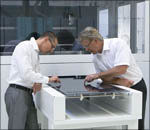05/14/2013 09:00:00 CEST At the world’s most important solar expo, the SNEC in Shanghai, which opens to the public this Tuesday, Manz AG will spotlight its highly integrated solutions for manufacturing crystalline solar cells as well as its turnkey production line for thin-film solar panels, the Manz CIGSfab.

- Turnkey thin-film production line CIGSfab strengthens competitive ability of panel producers worldwide
- High-tech engineering company helping China achieve the goals in its 12th five-year plan with regard to environmental protection and regional development
- Production site for solar and display equipment in Chinese city of Suzhou secures Manz’s proximity to Asian customers
Manz AG is one of the world’s leading high-tech engineering firms with an extensive portfolio for solar cell and panel, display, and lithium-ion battery production. At the world’s most important solar expo, the SNEC in Shanghai, which opens to the public this Tuesday, the company will spotlight its highly integrated solutions for manufacturing crystalline solar cells as well as its turnkey production line for thin-film solar panels, the Manz CIGSfab.
“With our CIGSfab, we offer panel producers worldwide an affordable and environmentally friendly production solution that they can use to come out of the industry’s current consolidation phase a winner,” said Dieter Manz, founder and CEO of Manz AG, prior to the expo. “I see three benefits for Asian customers: manufacturers gain access to the world’s leading thin-film technology, the large share of local value creation secures low production costs even at capacities under 200 MW, and local jobs for highly qualified individuals will be created.”
In its 12th five-year plan, which has been in effect since 2011, China’s government declared CIGS technology the key technology for the region’s economic development and for more environmental protection in China. “We are the world’s only supplier of a turnkey line for CIGS panels,” said Mr. Manz. “This means we have the ability to support the government of the People’s Republic of China in achieving its economic and environmental goals.” Manz achieved a record efficiency of 14.6% with CIGS panels in September 2012, reaching the level of efficiency for polycrystalline solar panels for the very first time. CIGS is considered the thin-film technology with the greatest potential for further increasing efficiency and cutting costs.
CIGS panels from Manz, which were produced on the innovation line at the company’s research facility in Schwäbisch Hall, Germany, have been in use in China since 2012 – namely in Shilin Town near the stone forest, a UNESCO World Heritage Site. This Chinese showcase project, with a nominal capacity of 1 MW, is currently the largest PV park installed with CIGS panels that feeds power into the Chinese grid. According the park’s operator, Manz’s CIGS panels have a yield up to ten percent higher than the crystalline solar panels already installed there.
Manz also exhibiting individual pieces of equipment for crystalline technology
Besides thin-film technology, Manz is also presenting powerful equipment for manufacturing the next generation of crystalline silicon cells. In addition to the VCS 1200 vacuum-coating system introduced last year for the front- and reverse-side passivation of crystalline solar cells, when it comes to these “PERC cells,” the high-tech engineering firm also has a new system concept for the laser-assisted ablation of the reverse-side coating in its portfolio. PERC cells make it possible to increase the efficiency of crystalline solar cells by up to 1 percent and, as such, noticeably cut the cost per watt.
Located about two hours west of the expo in Shanghai, Manz’s newly opened factory in Suzhou, with approximately 16,000 square of meters of production space, is playing a key role in the company’s success in Asia. Manz primarily manufactures production systems for the solar industry and touch-screen display manufacturers in Suzhou. “Our customers from a variety of industries benefit from our expertise in six fields of technology: automation, laser processes, vacuum coating, screen printing, metrology, and wet-chemical processes,” says Dieter Manz, “and as their production processes become more complex and require them to develop and test new equipment together, they want business partners that can offer them German standards of quality at local terms and conditions. This is the only way they can reach the next level of efficiency and cut their production costs.”
